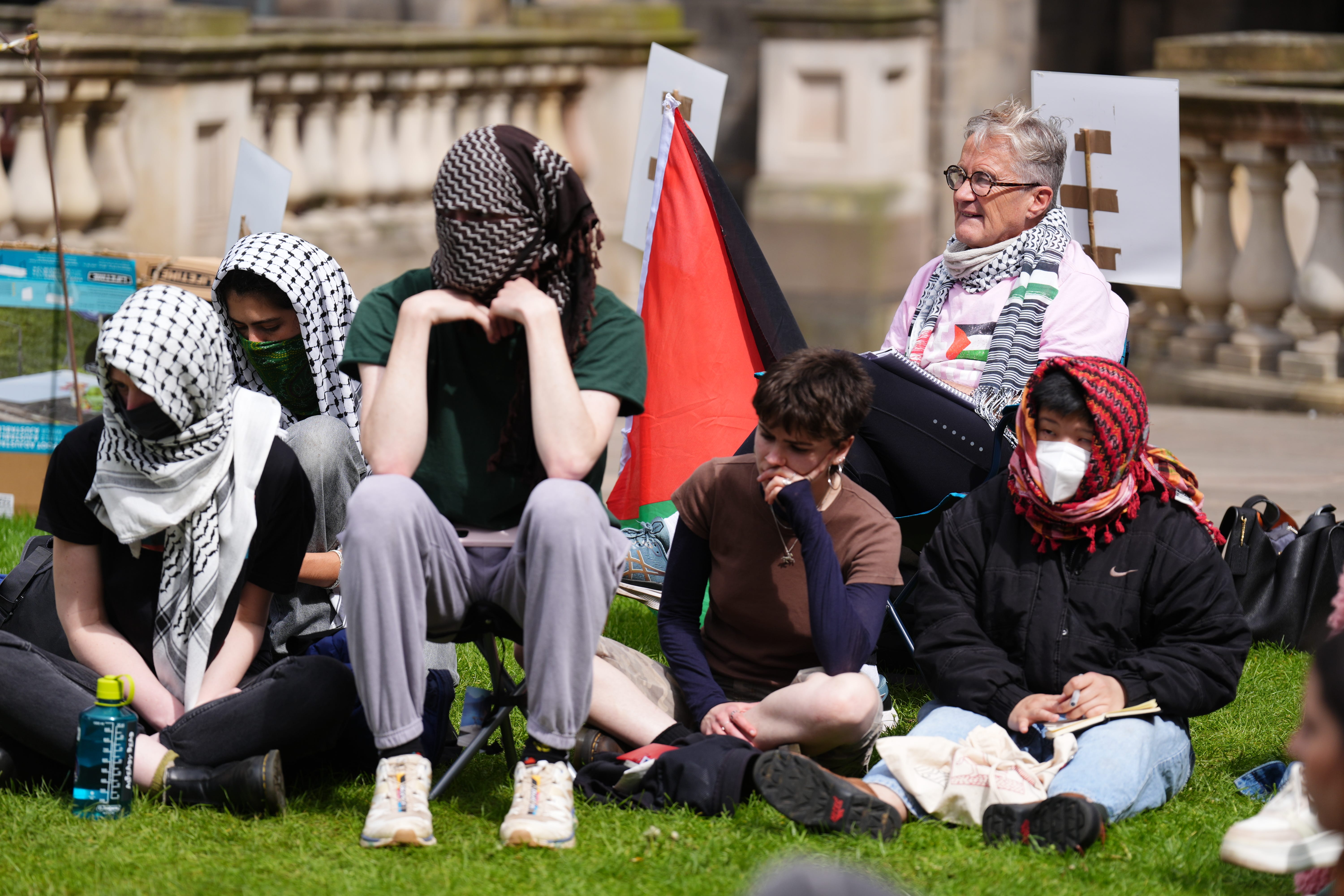Students on hunger strike in Gaza protest urged not to risk their health
Members of the Edinburgh University Justice for Palestine Society have been on hunger strike throughout much of this week.

Students taking part in a hunger strike in a call for a ceasefire in Gaza have been urged not to take risks with their health or wellbeing.
A group of students from Edinburgh University Justice for Palestine Society (EUJPS) have been on hunger strike for much of the week.
They are protesting outside the university’s Old College for an end to the Israel-Hamas conflict and said they refuse to be educated by a university that “directly contributed to the colonialisation of Palestine through its close ties with Lord Arthur Balfour”.
Lord Balfour was a former British prime minister who, in 1917, said in the Balfour Declaration that the UK Government supported the “establishment” of a “national home for the Jewish people” in Palestine.
Professor Sir Peter Mathieson, principal and vice-chancellor of the university, said it supports the students’ right to protest and fully recognises the “strength of feeling that you have demonstrated with your actions”.
In a statement issued on the university’s website, he thanked the group for having led a peaceful protest and for not creating obstruction for staff and other students.
He added: “Our primary concern has always been and will always be the safety, security and wellbeing of all members of our university community.
“There will be people with views very different from yours: they are also welcome to express them in peaceful and lawful ways.
“A university should be a place where the most sensitive, topical and complex matters can be openly debated in an atmosphere of respect and safety.
“We have very recently been notified of the intention of an unknown number of students to commence a hunger strike as an indication of their strength of feeling and determination around issues related to Palestine and Israel.
“Whilst we recognise their bodily autonomy, we appeal to them and others not to take risks with their own health, safety and wellbeing.
“Please make yourself known to us at any point at which we may be able to direct you to support.
“We are in daily contact with the protesters to ensure they are aware of the health and wellbeing support available to them.”
In Aberdeen, students have led similar protests this week, calling for a ceasefire.
It comes as part of a wider number of student protests across the UK over the Israel-Hamas conflict.
Students from more than a dozen UK universities, including Oxford and Cambridge, are taking similar action.
University vice-chancellors have been invited to a meeting at No 10 Downing Street on Thursday, where Prime Minister Rishi Sunak and Education Secretary Gillian Keegan will discuss antisemitism on campuses and ensuring the safety of Jewish students.
The Prime Minister’s official spokesperson said on Tuesday: “The right to free speech does not include the right to harass people or incite violence.
“We expect university leaders to take robust action in dealing with that kind of behaviour and that will be the subject of the conversation in No 10 later this week to ensure a zero-tolerance approach to this sort of behaviour is adopted on all campuses.”
More than 100 people attended a demonstration outside King’s College, Cambridge, on Tuesday – where a protester with a megaphone by the encampment led a chant of “From the river to the sea, Palestine will be free”.
The Office for Students, the higher education watchdog for England, said while it supports free speech it cannot tolerate discrimination.
Arif Ahmed, its director of freedom of speech, said: “Universities should uphold free speech within the law for everyone.
“But this does not, and cannot, include discrimination against, or harassment of, Jewish students, or any other conduct prohibited by law. Peaceful protest is itself a legitimate expression of freedom of speech.
“We expect universities and colleges to make provision for the lawful expression of the greatest possible range of ideas and opinions, even those that some may find deeply offensive.
“Whilst universities and colleges should not seek to suppress the lawful expression of any idea or viewpoint, we recognise that to manage their affairs effectively and safely, they may have to regulate the time, place and manner of expression, where there are compelling reasons to do so.”
A spokesperson for the University of Aberdeen said its vice-chancellor would not be attending the Downing Street meeting.
They added: “The university respects and supports the right to peaceful and lawful protest.
“Our campus should be a safe space for all and we are clear that any incidents of harassment or discrimination will not be tolerated.”
EUJPS was contacted for comment.
Bookmark popover
Removed from bookmarks